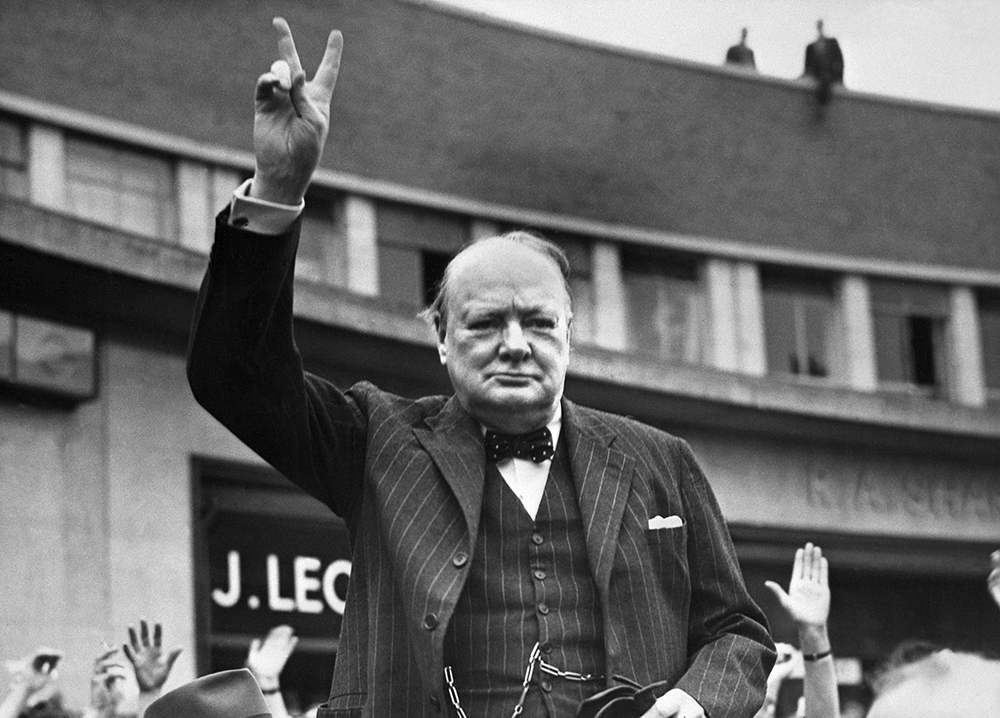‘Macmillan,’ said my husband with rare succinctness. Someone on the wireless had just asked who it was who said: ‘Events, dear boy.’ I agreed with my husband, as in moments of weakness I do. But what is the source of the quotation?
The first rule is that most common quotations were not said by the people to whom they are attributed. The second rule is like unto it: a few big names – Winston Churchill, Oscar Wilde – attract quotations as magnets attract iron-filings.
So, talking of iron, Churchill’s phrase the iron curtain had been used before him. It secured attention, though, when he used it in a speech at Fulton, Missouri, in 1946: ‘From Stettin in the Baltic to Trieste in the Adriatic, an iron curtain has descended across the Continent.’
Someone found that the phrase had been used by Vasily Rozanov in 1918 in his book The Apocalypse of Our Times: ‘An iron curtain is being lowered, creaking and squeaking, at the end of Russian history.’ I can’t say I knew anything about Rozanov and I have no intention of reading that book.
His metaphor came from the theatre. In 1794, the Morning Post had reported that the new Drury Lane Theatre had ‘an iron curtain, which extends to the walls, and is so calculated as completely to prevent the flames spreading to the front of the House, though the scenes were to catch fire’. The theatre burnt down on 24 February 1809.
It was then that Richard Brinsley Sheridan, the owner of the theatre, as he sat in the Piazza Coffee House near the burning building, was reputed to have responded to remarks about his philosophical calmness: ‘A man may surely be allowed to take a glass of wine by his own fireside.’
Or did he say that? Thomas Moore reported it in his Memoirs of Sheridan but ‘without vouching for the authenticity’ of the anecdote, which, he conceded, might have been ‘attendant upon all fires, since the time of Hierocles’, a philosopher of Alexandria, who could have been expected to know about the fire that destroyed the library there, although revisionist history doubts even that happened.
Rozanov brought the iron curtain down on ‘the end of history’, itself a phrase incorporated by Francis Fukuyama into the title of a book in 1992. In 1920, Ethel Snowden had seen the curtain differently in her Through Bolshevik Russia: ‘We were behind the “iron curtain” at last!’ The outspoken wife of Philip Snowden, later a Labour Chancellor of the Exchequer, she had called for state control of marriage, believing that the mentally ill and anyone under 26 should not be able to marry. Yet she was not an utter idiot, observing: ‘I know everybody I met in Russia outside the Communist party goes in terror of his liberty or his life.’
In 1945, a year before Churchill, Sir Thomas St Vincent Troubridge (from a line of naval baronets, though he spent his last decade as Examiner of Plays in the Lord Chamberlain’s Office) declared that ‘an iron curtain of silence has descended, cutting off the Russian zone from the western Allies’. Even Goebbels used the phrase, for heaven’s sake, in 1945, in the magazine Das Reich. But when we hear the words iron curtain, we do not, fortunately, think of Goebbels. Iron curtain is consciously associated with Churchill and not wrongly.
And as almost every writer of letters to the newspapers knows, Voltaire said: ‘I disapprove of what you say, but I will defend to the death your right to say it.’ He did not say it, though.
The words were first published in 1907 in a book by S.G. Tallentyre, or so the Oxford Dictionary of Quotations says. But there was no such person as S.G. Tallentyre, for that was a mere pen-name of a writer called Evelyn Beatrice Hall. In a letter in 1939 to Modern Language Notes, she made it clear that the words were hers, and she wasn’t pretending they were Voltaire’s. It did no good. No one ever writes: ‘In the words of Evelyn Beatrice Hall, “I disapprove of what you say…”.’
As for Macmillan, no definite source has been found. No one knows to whom he said it or when. ‘Events, dear boy’ sounds like him. More than 20 years ago Robert Harris called the phrase ‘infuriatingly ubiquitous’ and there has been no let-up since. The infuriation persists, everywhere.






Comments